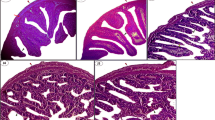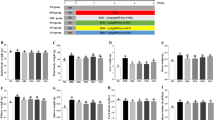Abstract
The balance between oxidant and antioxidant systems may be important in the pathogenesis and/or maintenance of tissue injury in ulcerative colitis. This study was designed to evaluate the effects of vitamin E and selenium supplementations on tissue injury and oxidative stress in trinitrobenzenesulfonic acid-induced ulcerative colitis in rats. Trinitrobenzenesulfonic acid administration severely changed the normal architecture of the colon and significantly increased the levels of malondialdehyde, protein carbonyl, and xantine oxidase (P < 0.001) in the colon homogenates of these rats. Supplementation of selenium to the trinitrobenzenesulfonic acid-treated rats neither improved the histopathological findings nor decreased the levels of malondialdehyde and protein carbonyl. Vitamin E supplementation reduced the levels of malondialdehyde and protein carbonyl but did not improve the colonic lesions. Supplementation of vitamin E+selenium significantly reduced both the severity of colonic lesions and the levels of malondialdehyde and protein carbonyl. In conclusion, we suggest that antioxidants and specific micronutrients may have beneficial effects in the treatment of ulcerative colitis.
Similar content being viewed by others
REFERENCES
Kirsner JB: Inflammatory Bowel Disease, 5th ed. Philadelphia, WB Saunders, 2000
Gordon PH, Nivatvongs S: Principles and Practice of Surgery for the Colon, Rectum, and Anus, 2nd ed. Montreal, Quality Medical, 1999
Lih-Brody L, Powell SR, Collier KP, Reddy GM, Cerchia R, Kahn E, Weissman GS, Katz S, Floyd RA, McKinley MJ, Fisher SE, Mullin GE: Increased oxidative stress and decreased antioxidant defenses in mucosa of inflammatory bowel disease. Dig Dis Sci 41:2078–2086, 1996
McKenzie SJ, Baker MS, Buffinton GD, Doe WF: Evidence of oxidant-induced injury to epithelial cells during inflammatory bowel disease. J Clin Invest 98:136–141, 1996
Yamada T, Grisham MB: Role of neutrophil-derived oxidants in the pathogenesis of intestinal inflammation. Klin Wochenschr 69:988–994, 1991
Verspaget HW, Mulder TP, van der Sluys Veer A, Pena AS, Lamers CB: Reactive oxygen metabolites and colitis: a disturbed balance between damage and protection. Scand J Gastroenterol Suppl 188:44–51, 1991
Mulder TP, Verspaget HW, Janssens AR, de Bruin PA, Pena AS, Lamers CB: Decrease in two intestinal copper/zinc containing proteins with antioxidant function in inflammatory bowel disease. Gut 32:1146–1150, 1991
Southey A, Tanaka S, Murakami T, Miyoshi H, Ishizuka T, Sugiura M, Kawashima K, Sugita T: Pathophysiological role of nitric oxide in rat experimental colitis. Int J Immunopharmacol 19:669–676, 1997
Morris GP, Beck PL, Herridge MS, Depew WT, Szewczuk MR, Wallace JL: Hapten-induced model of chronic inflammation and ulceration in the rat colon. Gastroenterology 96:795–803, 1989
Grisham MB, Volkmer C, Tso P, Yamada T: Metabolism of trinitrobenzene sulfonic acid by the rat colon produces reactive oxygen species. Gastroenterology 101:540–547, 1991
Zeeh JM, Procaccino F, Hoffmann P, Aukerman SL, McRoberts JA, Soltani S, Pierce GF, Lakshmanan J, Lacey D, Eysselein VE: Keratinocyte growth factor ameliorates mucosal injury in an experimental model of colitis in rats. Gastroenterology 110:1077–1083, 1996
Buege JA, Aust SD: Microsomal lipid peroxidation. Methods Enzymol 52:302–310, 1978
Reznick AZ, Packer L: Oxidative damage to proteins: spectrophotometric method for carbonyl assay. Methods Enzymol 233:359–363, 1994
Cighetti G, Debiasi S, Paroni R: Effect of glutathione depletion on the conversion of xanthine dehydrogenase to oxidase in rat liver. Biochem Pharmacol 45:2359–2361, 1993
Babbs CF: Oxygen radicals in ulcerative colitis. Free Radic Biol Med 13:169–181, 1992
Keshavarzian A, Sedghi S, Kanofsky J, List T, Robinson C, Ibrahim C, Winship D: Excessive production of reactive oxygen metabolites by inflamed colon: analysis by chemiluminescence probe. Gastroenterology 103:177–185, 1992
Nieto N, Torres MI, Fernandez MI, Giron MD, Rios A, Suarez MD, Gil A: Experimental ulcerative colitis impairs antioxidant defense system in rat intestine. Dig Dis Sci 45:1820–1827, 2000
Yavuz Y, Yuksel M, Yegen BC, Alican I: The effect of antioxidant therapy on colonic inflammation in the rat. Res Exp Med (Berl) 199:101–110, 1999
Fiocchi C: Intestinal inflammation: a complex interplay of immune and nonimmune cell interactions. Am J Physiol 273:G769–G775, 1997
Grisham MB, Yamada T: Neutrophils, nitrogen oxides, and inflammatory bowel disease. Ann NY Acad Sci 664:103–115, 1992
D'Odorico A, Bortolan S, Cardin R, D'Incá R, Martines D, Ferronato A, Sturniolo GC: Reduced plasma antioxidant concentrations and increased oxidative DNA damage in inflammatory bowel disease. Scand J Gastroenterol 36:1289–1294, 2001
Koch TR, Yuan LX, Stryker SJ, Ratliff P, Telford GL, Opara EC: Total antioxidant capacity of colon in patients with chronic ulcerative colitis. Dig Dis Sci 45:1814–1819, 2000
Buffinton GD, Doe WF: Depleted mucosal antioxidant defences in inflammatory bowel disease. Free Radic Biol Med 19:911–918, 1995
Koch TR, Yuan LX, Stryker SJ, Ratliff P, Telford GL, Opara EC: Total antioxidant capacity of colon in patients with chronic ulcerative colitis. Dig Dis Sci 45:1814–1819, 2000
Salim AS: Role of oxygen-derived free radical scavengers in the management of recurrent attacks of ulcerative colitis: a new approach. J Lab Clin Med 119:710–717, 1992
Sturniolo GC, Mestriner C, Lecis PE, D'Odorico A, Venturi C, Irato P, Cecchetto A, Tropea A, Longo G, D'Inca R: Altered plasma and mucosal concentrations of trace elements and antioxidants in active ulcerative colitis. Scand J Gastroenterol 33:644–649, 1998
Bhaskar L, Ramakrishna BS, Balasubramanian KA: Colonic mucosal antioxidant enzymes and lipid peroxide levels in normal subjects and patients with ulcerative colitis. J Gastroenterol Hepatol 10:140–143, 1995
Durak I, Yasa MH, Bektas A, Kacmaz M, Cimen MY, Ozurk HS: Mucosal antioxidant defense is not impaired in ulcerative colitis. Hepatogastroenterology 47:1015–1017, 2000
Ip C, Hayes C: Tissue selenium levels in selenium-supplemented rats and their relevance in mammary cancer protection. Carcinogenesis 10:921–925, 1989
Patterson RE, White E, Kristal AR, Neuhouser ML, Potter JD: Vitamin supplements and cancer risk: the epidemiologic evidence. Cancer Causes Control 8:786–802, 1997
Schwenke DC, Behr SR: Vitamin E combined with selenium inhibits arteriosclerosis in hypercholesterolemic rabbits independently of effects on plasma cholesterol concentrations. Circ Res 83:366–377, 1998
Mutlu-Turkoglu U, Erbil Y, Oztezcan S, Olgac V, Toker G, Uysal M: The effect of selenium and/or vitamin E treatments on radiation-induced intestinal injury in rats. Life Sci 66:1905–1913, 2000
Reynolds PD, Rhenius ST, Hunter JO: Xanthine oxidase activity is not increased in the colonic mucosa of ulcerative colitis. Aliment Pharmacol Ther 10:737–741, 1996
Author information
Authors and Affiliations
Rights and permissions
About this article
Cite this article
Ademoglu, E., Erbil, Y., Tam, B. et al. Do Vitamin E and Selenium Have Beneficial Effects on Trinitrobenzenesulfonic Acid-Induced Experimental Colitis. Dig Dis Sci 49, 102–108 (2004). https://doi.org/10.1023/B:DDAS.0000011610.47179.0b
Issue Date:
DOI: https://doi.org/10.1023/B:DDAS.0000011610.47179.0b




